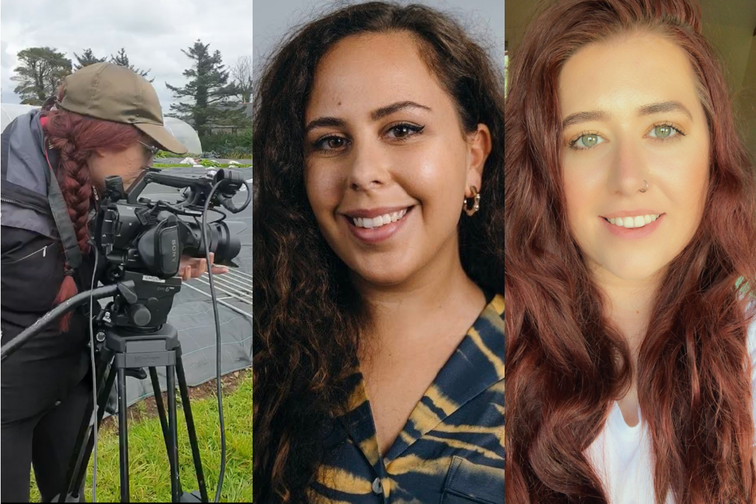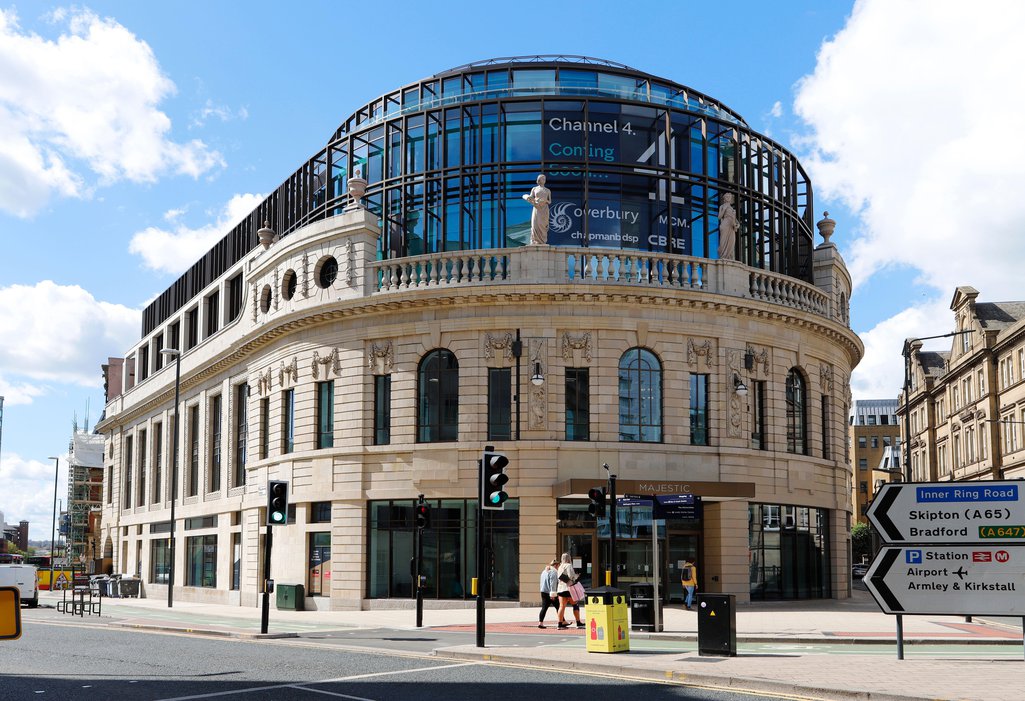Channel 4 gave these young people their break. Now it’s up for sale
Producers who worked on C4 programmes say the broadcaster was already ‘levelling up’. Will a private owner be so committed to new UK talent?

Securing a job in the TV industry is no mean feat for a young graduate, particularly if you live 300 miles away from London.
When Shannon Hamilton left Ulster University with a first-class degree in media and production, moving wasn’t an option.
“My first job out of university was in fast food,” she said. “I come from a working-class, single-parent background. So I couldn’t just up sticks to London and expect mum to foot the bill.”
After being accepted onto a trainee scheme run by Northern Ireland Screen in 2019, Hamilton cut her teeth working on Channel 4 programmes made in Belfast by independent production companies. The broadcaster spent £5m in Northern Ireland that year.
It was on a Channel 4 series that Hamilton got her first credit as an assistant producer in 2021. “I went from KFC to TV,” she joked.
Culture secretary Nadine Dorries announced this week that the government had decided to go ahead with its plan to sell off Channel 4, following a consultation launched last year.
Part of the justification offered by Dorries was that the proceeds of the sale, which the government hopes will raise £1bn, will further its “levelling up agenda [in] the creative sector” by “putting money into independent production and creative skills in priority parts of the country”.
Critics of the proposal say Channel 4 already offers the UK’s nations and regions training opportunities and hundreds of millions of pounds in funding every year.
Even a group of senior Tories, including former culture secretary Karen Bradley, have come out against the plan. In a letter to the prime minister, they argued that the broadcaster fulfils Margaret Thatcher’s founding vision for it by acting “as an incubator for independent, risk-taking, innovative private sector companies”.
Channel 4 has remained a unique proposition since it was launched in 1982 under the then Conservative prime minister. Although publicly owned, it is entirely privately funded, mostly through advertising revenue. More significantly, it has no in-house production studios of its own: unlike the BBC or ITV, it commissions all its original programming externally.
For John McVay, the chief executive of the Producers Alliance for Cinema and Television (PACT), which represents independent production companies and distributors, the results are plain to see.
“It has helped generations of entrepreneurs, self-starters or people who left the BBC saying ‘fuck that, I don’t want to work for Auntie any more’ grow a business,” he said.
Channel 4 hasn’t been quite as forthright in making its case, but it has stressed the economic benefits it brings to the industry, particularly outside London. A report the broadcaster commissioned from accounting firm EY last year found it supported nearly 3,000 jobs in the UK outside London in 2019.
Some have previously questioned Channel 4’s track record on regional productions. Like other public service broadcasters, it has been accused of hitting quotas by using production companies that claim to be regional but are merely outposts of London-based firms.
Ofcom, the broadcasting regulator, tightened the rules on what counts towards Channel 4’s 35% minimum quota for non-London productions in 2019. Last year, Channel 4 produced 66% of its programmes outside the capital, compared to 48% in 2011.

Channel 4's relocated headquarters in Leeds city centre.
In 2019 and 2020, Channel 4 opened “creative hubs” in Bristol and Glasgow, and last year it opened its new headquarters in Leeds. The relocation from London – which had been bitterly resisted by C4’s previous chief executive – was a concession to the government for dropping a previous privatisation attempt in 2017.
True North in Leeds is one of the UK’s biggest independent production companies outside London. Its founder Andrew Sheldon told openDemocracy that C4’s move to the city was a “huge source of civic pride” and that it would help address regional inequalities.
“Television as a whole is dominated by white, middle-class, Oxbridge-educated people,” he said. “If you’re a working-class kid from Hartlepool, you don’t have a job unless you’ve got parents who can support you moving down to London for six months.
“Now, Channel 4 has created a door for lots of kids to knock on.”
True North was one of the first companies Channel 4 invested in as part of its Indie Growth Fund in 2014. Since then, the broadcaster has given funding to a further 16 companies, the majority of which are based in Glasgow.
I’m a mixed-race woman and it’s really important to me to have that sort of experience represented on screen and behind the camera.
Nicole Kleeman runs one of those companies, Firecrest Films. She told openDemocracy the funding had allowed her to hire more staff and take part in the broadcaster’s trainee scheme.
“No other broadcaster has ever done that,” she said. “They’ve been instrumental to our growth and instrumental in providing employment, which reflects what the government wants in a levelling up agenda.” She added: “To me, the privatisation of the channel just doesn’t make any sense at all.”
Some have pointed out that the government’s focus on ‘levelling up’ between the north and south completely overlooks other inequalities – such as race, class and disability – in the UK.
Noor Abdel-Razik, who worked on Channel 4’s production trainee scheme, had a placement at Firecrest in 2018. She now works for Glasgow production company Two Rivers Media, which the broadcaster also owns a stake in.
“Racial diversity is incredibly important to me because there are still these perceptions of what Glaswegians look like. I’m a mixed-race woman and it’s really important to me to have that sort of experience represented on screen and behind the camera,” she said.
Last year, Abdel-Razik worked on Channel 4’s Unapologetic, billed as a late-night show where “Black people talk freely about everything”.
“Every broadcaster needs to do more. But I do think it’s in Channel 4’s blood to strive for that,” she added.
The government’s claims that a new buyer would maintain Channel 4’s commitments to regional productions and diversity have been met with intense scepticism by senior industry figures.
“There’ll be voices and perspectives that aren’t commercially interesting enough for the new commercial owners, who’ll say: ‘Well, hold on, we’re not going to give airtime to that – it’s not going to make us any money,’” said PACT’s McVay.
The culture secretary’s belief that privatising Channel 4 will help it compete with Netflix is misguided, McVay added. The government has suggested that going private will help the broadcaster secure venture capital funding – something it cannot do at present.
“It’s a completely different business model. Streamers aren’t interested in making public service broadcasting – they want to make something that 50 million people around the world are going to watch rather than something which really resonates with the British public,” he said.
For now, many young people credit Channel 4 for kick-starting their careers. Back in Belfast, Shannon Hamilton now works for Strident Media, whose CEO said last month that the broadcaster has provided the local industry with “invaluable opportunities”.
A lot has changed for Hamilton in the years since she graduated. One of the highlights of her career has been meeting her idol, the documentary maker Louis Theroux.
“I gave him my business card,” she laughed. “I don’t know what I was thinking. At that point I was just a trainee.
“But that’s what I was taught: to put yourself out there and take your chance.”
One thing that hasn’t changed is her connection to her roots.
“Growing up, you want to see yourself reflected on TV,” she said. “And for us in Northern Ireland, you want to hear Northern Irish accents on TV, and God knows we go wild for it when we hear it.
“If you hear someone's doing well, on programmes that are for BBC or ITV or Channel 4, who are from Northern Ireland, you get that sense of: ‘Oh my gosh, I could do that.’”

%20(2)%20(2)%20(1).png)
No comments:
Post a Comment
Note: only a member of this blog may post a comment.